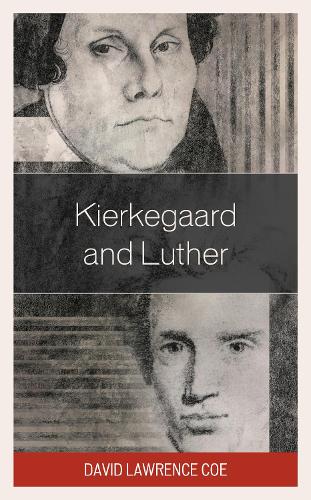
Kierkegaard and Luther
(Paperback)
Available Formats
Publishing Details
Kierkegaard and Luther
By (Author) David Lawrence Coe
Bloomsbury Publishing PLC
Lexington Books/Fortress Academic
20th December 2021
United States
Classifications
Professional and Scholarly
Non Fiction
History of religion
Philosophy
230.0440922
Winner of Outstanding Academic Title 2021
Physical Properties
Paperback
274
Width 153mm, Height 219mm, Spine 21mm
413g
Description
Sren Kierkegaard denounced nineteenth-century Danish Lutheranism for exploiting Martin Luther's doctrine of justification "without works" as justification for an antinomian easy life. Kierkegaard saw his own writing as a corrective: I have wanted to prevent people in Christendom from existentially taking in vain Luther and the significance of Luther's life. In 1847, Kierkegaard began an eight-year reading of Luthers sermons, forking through them for extracts to confirm his theological corrective rather than to comprehend the breadth of Luthers thought. While he found much to laud, Kierkegaard also found much to lance, privately commenting that Luther was partially responsible for what he considered the problematic Lutheranism of his own day. Furthermore, David Coe argues, Kierkegaard was unaware that his copy of Luther's church and house postils was a heavily abridged edition of extracts from those postils. Therefore, his appraisal of Luther begs to be investigated. Kierkegaard and Luther examines the Luther sermons Kierkegaard read, what he praised and criticized, missed, and misjudged of Luther, and spotlights the concord these two Lutheran giants actually shared, namely, the negative yet necessary role that Christian suffering (Anfechtung/Anfgtelse) plays in Christian faith and life.
Reviews
Martin Luthers influence on Sren Kierkegaard is undeniable, yet the specific details of that influence have been underdeveloped in the scholarly literature. Coe (theology and philosophy, Concordia Univ., Nebraska) aims to fill that gap by offering a careful reading of Kierkegaards writings on Luther alongside a deep engagement with the Lutheran source texts Kierkegaard drew from and commented on. Coes argument is sophisticated, and his scholarship is impeccable. The book is well researched and will likely stand as the most important resource on the Kierkegaard/Luther relationship in the coming decades. The volume is as much about Luther as it is about Kierkegaard. Specifically, Coe compellingly argues that Kierkegaards understanding of Luther was marked by limitations that should motivate rethinking Kierkegaards charge that Luther failed to incorporate dialectic into his theology in ways that would protect against the abuses of Danish Lutheranism so prominent in the 19th century. According to Coe, a more robust reading of Luthers texts allows an interpretation of his work that already incorporates the dialectical aspects for which Kierkegaard was looking. Simply put, this book is excellent. Summing Up: Essential. Upper-division undergraduates through faculty.
* Choice *Kierkegaard and Luther provides a clear and riveting portrait of the relationship of the great Danish Lutheran to Luther himself. David Lawrence Coe, who clearly has great empathy for both thinkers, looks at both the lauds and lances Kierkegaard directs at Luther, but shows, through deep historical scholarship, that even the lances often reflect a perspective that is more authentically Lutheran than Kierkegaard himself realized. -- C. Stephen Evans, Baylor University and the University of St. Andrews
Many have attempted evaluations of the relationship of Kierkegaard to Luther on the basis of the similarity or contrast of their ideas, but Coe actually examines the texts written by the two. He assesses the ambiguous relationship with Luther that Kierkegaard reveals in his diaries, and he shows how Kierkegaard used Luthers postil sermons in forming his own expressions of the faith. This study effectively and insightfully opens a new dimension of understanding Luthers impact on Kierkegaard and of interpreting Kierkegaards impact on modern theologians, both Lutheran and those of other traditions. -- Robert Kolb, emeritus, Concordia Seminary, Saint Louis
Coes marvelous and engagingly written volume fills a yawning gap in Kierkegaard scholarship. For over a century scholars have puzzled over the relationship of Kierkegaard and Luther, for Kierkegaards texts express a profound indebtedness to Luthers principle of sola fide, while his later journal entries frequently blame Luther for the spiritual lassitude of bourgeois Christianity. Coe sheds needed light on Kierkegaards ambivalence. While Kierkegaard applauded Luthers focus on the subjective appropriation of unmerited grace, he critiqued him for not dialectically emphasizing the need to actually follow Christ. With rare thoroughness, Coe discovers that Kierkegaards understanding of Luther was based on edited versions of Luthers homilies that underplayed the tensive nature of Luthers thought. One of the most valuable aspects of this book is the discovery that Luther was much more dialectical than Kierkegaard realized. While not minimizing their differences, Coe convincingly shows that these two theological giants of the Lutheran tradition shared a common appreciation of the interaction of the indicative of grace and the imperative of works in the Christian life. -- Lee C. Barrett, Lancaster Theological Seminary
Author Bio
David Lawrence Coe is assistant professor of theology and philosophy at Concordia University, Nebraska.
